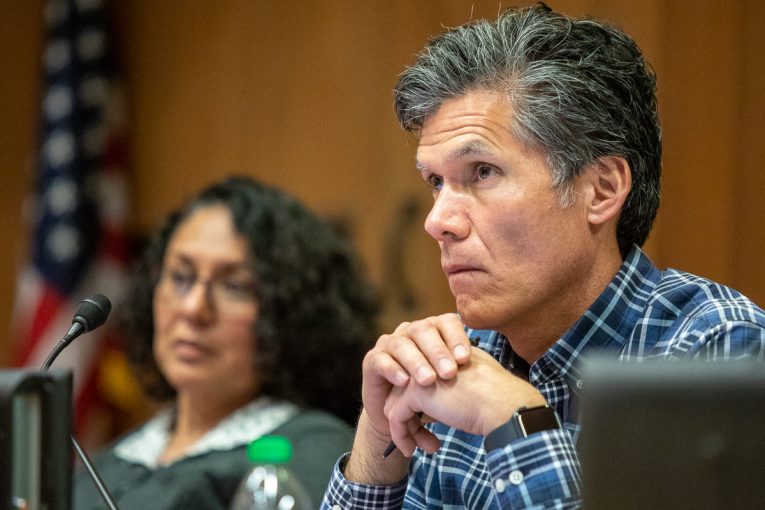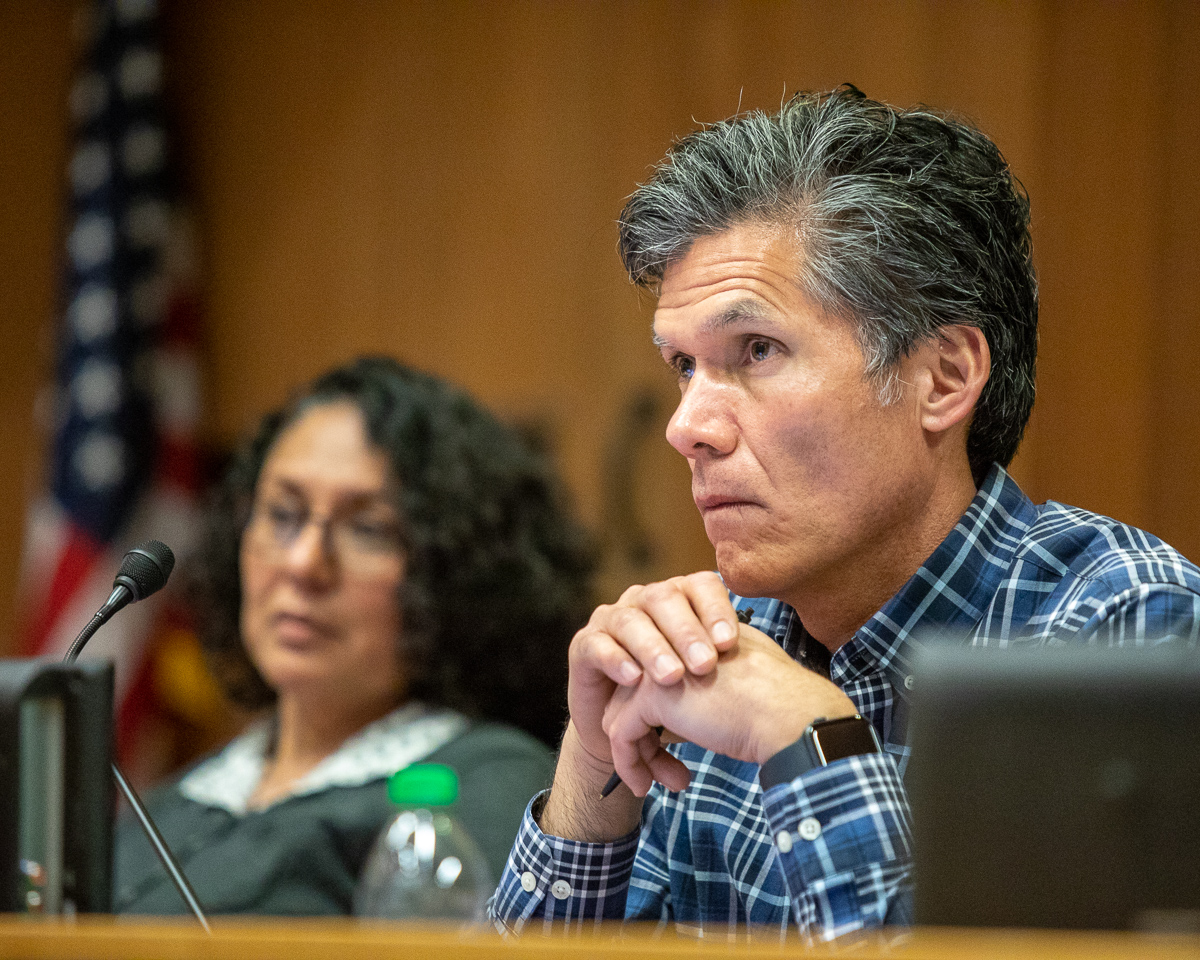

Critics of the council are charging that the council is out of step with the community on a variety of big issues: Parking, Roads, Housing and the Claw.
But let’s take a look because it seems like a selective reading of the overall council body of work ignores a good deal of countervailing evidence.
For one thing, it is hard to figure out where the council stands on an issue like parking. Their own statements were made on Monday where each expressed skepticism about the staff proposal. As Lucas Frerichs put it, “I’m totally opposed to paid parking meters.” He said that additional lots make sense, but “individual meters are, for me, not acceptable.”
The ultimate 4-0 vote with Will Arnold recusing himself ended up with the council trying to find middle ground and actually responding to public opinion. A lot of assumptions about the council were made in advance. Many assumed they would attempt to ram a proposal down the throats of a community opposed, but the reality was that they have always swung toward consensus within their body and finding a middle ground in the community – if there is one.
I would argue one of the problems here was that the council was kind of in an impossible position. Contrary to some stances, the status quo for parking was neither tenable nor sustainable. They could not simply do nothing.
On the other hand, the opposition was simply about “no” – there was no middle ground. Neither the business community nor the Davis Chamber offered anything in realistic alternative paths. Building new structures was fiscally infeasible. The rest did not resolve the problems of peak hour traffic.
Was it a perfect solution? No. As a proponent of paid parking, I was not happy. Opponents of paid parking were not happy either.
I don’t view that as the council being out of step – I view that as council making tough decisions that attempt to move the ball forward while working within the limitations imposed by the  community.
community.
I see the issue of green waste in a similar light. Davis as a community has been opposed to the idea of containerization for years. Every time the council has considered it, public opinion has pushed back and made it impractical to go forward.
Again the council aims to thread the needle between what the best practices are, what the consultants and their commissions recommend, and community pushback.
Other issues that are raised: the roads tax and Trackside.
On both I disagree with the council being out of step with the community.
The roads tax received 58 percent of the vote. To put that into context – that was more than WDAAC (West Davis Active Adult Community) and just less than Nishi – both of which passed handily. It was a slightly larger margin than the successful sales tax.
It failed due to quirks in the state law that require a two-thirds vote. I’m sorry but it is really hard to accept the premise that, because the council only got the support of 58 percent of the people, they are out of step with the community.
Passing taxes are difficult, which is why Assemblymember Cecilia Aguiar-Curry this week pushed for ACA 1 to address public infrastructure challenges that could “empower California communities to take action at the local level to improve the economies, neighborhoods and residents’ quality of life.”
Since 2001, over 2,200 local revenue measures have been placed before voters. Nearly 80 percent of all two-thirds supermajority measures garnered more than 55 percent “yes” votes, but ultimately failed passage because they fell slightly short of the current two-thirds vote threshold.
“I have seen first hand the deterioration of our once world-class infrastructure,” the assemblymember said during remarks on Wednesday. “As local government committee chair, I have heard about deteriorating buildings, decrepit community facility and our extreme lack of affordable housing.”
Is the council out of touch or is it a heavy-lift to get the voters to approve roads when they have just renewed the parks tax (at over 70 percent of the vote), just passed a new parcel tax, and soon were going to pass a facilities bond?
I don’t see the council as out of touch when the vast majority of the citizens support them.
Then there is Trackside. Unlike Measure I, we don’t have a public vote, so it is hard to tell that the council is out of touch. They were definitely out of touch with the Old East Davis Neighborhood which heavily opposed the measure, and then sued and at least temporarily won.
But, as we noted at the time, very few members of the public not living in Old East Davis came to the meeting to oppose the measure.
Moreover, the two council candidates in 2018 who most identified with the opposition to Trackside finished fourth and fifth. Not putting that down, but I don’t really see strong evidence here of community backlash.
Finally, by focusing on just these issues we get a skewed view of the council. Let us look at the broader housing issue. This council has approved housing for the following locations: Nishi (2018), WDAAC, Sterling, Lincoln40, Davis Live, and now Chiles Road.
Of those six projects, very few of them attracted any opposition. Two of them went to the ballot in 2018 and both of them passed with at least 55 percent of the vote. An overwhelming number of college students came out from 2017 to 2018 to support student housing project – the council backed them with supportive votes and the citizens in the case of Nishi also backed them.
To use Trackside as a measure of the council being out of step with the community, and to ignore the other housing projects, presents a very skewed view of the council’s work the last several years.
In fact, I would argue that the people making the argument that the council is out of step on housing are in fact more out of step with the community than the council with regard to housing policy.
There are always going to be tough issues and tough choices for an elected body to make. But I really don’t see a lot of evidence that the council is out of step with the community, other than on a very few number of issues – and when they have been, they have worked hard to find middle ground and also revisit issues. They are not ramming through controversial policy on 3-2 votes and ignoring public sentiment as past councils did in the not-too-distant past.
—David M. Greenwald reporting


I was reading on the other site, that the group of people who lost every single election last year except for Measure I (where they still only got 42 percent) are claiming that the city council is out of step with the community. They might want to look in the mirror.
I went over there, to the ‘other site’. Hadn’t been there in months, as it bores me to tears and is an author-moderated echo chamber. However, going there as per CR’s suggestion, it did answer the question of who the ‘some’ was, and an article with a virtually identical title. Very weird.
Who are the “Some Are Saying…” referenced in the headline and the article?
[Moderator: edited. Stick to the topic. Criticisms of the Vanguard’s practices can be directed to David privately. They will be removed from comments.]
Yeah, agree. Though it’s not anonymous ‘sources’, it’s just the ‘some’ thing is a lazy stylistic technique that I believe anyone with half an ounce of grey matter can see past.
Let me make this very clear.
Any concerns about the management or practices of the Vanguard should be discussed directly with David Greenwald. Posts on those topics will be removed.
Any comments directed to the moderator will be removed.
Thread cleanup:
10111215 comments removed so far.16?
24 by my count
The irony here with all the stuff flying here is no one addresses the substance of the article – is the council out of step with the community? The article makes a case that it’s not. No one has argued otherwise.
Maybe that’s because the article has no substance.
“Is the council out of step with the community?”
I also wonder about this. I heard NextDoor allows public agencies to register (as an agency) for free. Then they can poll people.
They can poll once to see what people think about something, then poll again to clarify details that people care about.
“Again the council aims to thread the needle between what the best practices are, what the consultants and their commissions recommend, and community pushback.”
I never understand this triangular dynamics. City council should be an entity. It should be a transparent mediator between one group of people in the community and another group of people in the same community. The city council itself shouldn’t have any agenda. Everything the city council does should be based on someone’s request from the community.